国际海运条例实施细则
海运条例实施细则
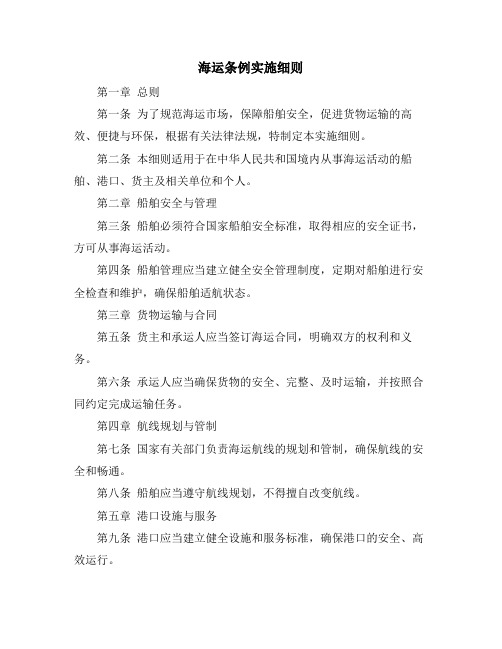
海运条例实施细则第一章总则第一条为了规范海运市场,保障船舶安全,促进货物运输的高效、便捷与环保,根据有关法律法规,特制定本实施细则。
第二条本细则适用于在中华人民共和国境内从事海运活动的船舶、港口、货主及相关单位和个人。
第二章船舶安全与管理第三条船舶必须符合国家船舶安全标准,取得相应的安全证书,方可从事海运活动。
第四条船舶管理应当建立健全安全管理制度,定期对船舶进行安全检查和维护,确保船舶适航状态。
第三章货物运输与合同第五条货主和承运人应当签订海运合同,明确双方的权利和义务。
第六条承运人应当确保货物的安全、完整、及时运输,并按照合同约定完成运输任务。
第四章航线规划与管制第七条国家有关部门负责海运航线的规划和管制,确保航线的安全和畅通。
第八条船舶应当遵守航线规划,不得擅自改变航线。
第五章港口设施与服务第九条港口应当建立健全设施和服务标准,确保港口的安全、高效运行。
第十条船舶使用港口设施,应当遵守港口管理规定,支付相应的费用。
第六章环境保护措施第十一条从事海运活动的单位和个人应当采取有效措施,防止和减少污染物的排放。
第十二条船舶应当配备必要的环保设施,确保符合国家和国际环保标准。
第七章公平竞争与禁止不正当竞争第十三条从事海运活动的单位和个人应当遵守公平竞争原则,不得进行不正当竞争。
第十四条国家有关部门应当加强对海运市场的监管,维护市场秩序。
第八章运输业务定义与范围第十五条海运业务包括但不限于散货运输、集装箱运输、滚装船运输等。
第十六条禁止从事非法运输活动,如走私、偷运等。
第九章相关活动与管理第十七条与海运相关的活动,如船舶修造、船员培训、海事救助等,应当符合国家和国际相关标准。
第十八条国家有关部门应当对从事相关活动的单位和个人进行监管,确保其合规运营。
第十章附则第十九条本细则自发布之日起施行,由XX部门负责解释。
第二十条本细则的修改,由XX部门提出,报国务院批准后公布实施。
第二十一条本细则未尽事宜,按照国家和国际有关法律法规执行。
海运船舶的海事法律与国际公约
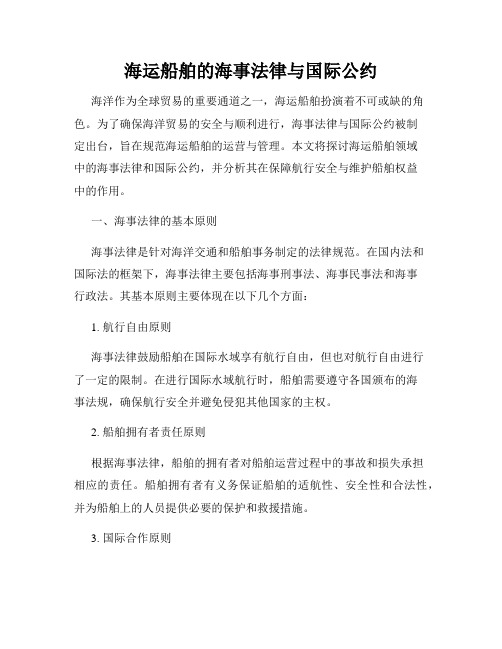
海运船舶的海事法律与国际公约海洋作为全球贸易的重要通道之一,海运船舶扮演着不可或缺的角色。
为了确保海洋贸易的安全与顺利进行,海事法律与国际公约被制定出台,旨在规范海运船舶的运营与管理。
本文将探讨海运船舶领域中的海事法律和国际公约,并分析其在保障航行安全与维护船舶权益中的作用。
一、海事法律的基本原则海事法律是针对海洋交通和船舶事务制定的法律规范。
在国内法和国际法的框架下,海事法律主要包括海事刑事法、海事民事法和海事行政法。
其基本原则主要体现在以下几个方面:1. 航行自由原则海事法律鼓励船舶在国际水域享有航行自由,但也对航行自由进行了一定的限制。
在进行国际水域航行时,船舶需要遵守各国颁布的海事法规,确保航行安全并避免侵犯其他国家的主权。
2. 船舶拥有者责任原则根据海事法律,船舶的拥有者对船舶运营过程中的事故和损失承担相应的责任。
船舶拥有者有义务保证船舶的适航性、安全性和合法性,并为船舶上的人员提供必要的保护和救援措施。
3. 国际合作原则海事法律的制定需要各国之间的国际合作与协商。
各国在海事领域通过签署国际公约、协定和谅解备忘录等形式,共同制定和实施海事法律,以维护航行安全和保护海洋环境。
二、国际公约对海运船舶的影响为了促进国际海洋贸易的发展,各国间签署了大量的国际公约。
这些公约对于海运船舶的运营和管理具有重要的影响。
1. SOLAS公约国际海上人员安全公约(SOLAS)是最早被签署并广泛实施的国际公约之一。
该公约对于船舶的结构、装备、人员培训和运营管理等方面提出了一系列的规范要求,旨在确保航行安全和减少船舶事故的发生。
2. MARPOL公约国际海洋污染防治公约(MARPOL)对于船舶的环境保护起到了重要的作用。
该公约规定了船舶在海上排放废弃物和污染物的限制,并倡导采用环保技术和措施,减少对海洋环境的污染。
3. 货物海洋运输公约货物海洋运输公约(Hague-Visby Rules)是为了保护货物运输利益而制定的公约。
国际贸易海运条款范本(2024年定制版)

20XX 标准合同模板范本PERSONAL RESUME甲方:XXX乙方:XXX国际贸易海运条款范本(2024年定制版)本合同目录一览第一条定义与解释1.1 合同当事人1.2 合同货物1.3 合同金额1.4 合同日期1.5 合同生效时间第二条运输方式与路线2.1 运输方式2.2 运输路线2.3 运输工具第三条装运与卸货3.1 装运期限3.2 装货地点3.3 卸货地点3.4 卸货期限第四条保险与风险转移4.1 保险责任4.2 保险金额4.3 风险转移时间第五条质量与数量5.1 货物质量5.2 货物数量第六条价格与支付6.1 合同价格6.2 支付方式6.3 支付期限第七条违约责任7.1 卖方违约7.2 买方违约第八条争议解决8.1 争议解决方式8.2 争议解决地点8.3 适用法律第九条合同的变更与解除9.1 合同变更条件9.2 合同解除条件第十条通知与协调10.1 通知义务10.2 协调义务第十一条保密条款11.1 保密内容11.2 保密期限第十二条不可抗力12.1 不可抗力事件12.2 不可抗力后果第十三条合同的转让13.1 合同转让条件13.2 转让通知义务第十四条合同的终止14.1 合同终止条件14.2 终止后的义务履行第一部分:合同如下:第一条定义与解释1.1 合同当事人1.1.1 本合同双方当事人分别为:1.1.2 双方通过本合同确认了各自的权利和义务,并同意按照本合同的条款进行交易。
1.2 合同货物1.2.1 货物的描述(1)货物名称:(详细描述货物名称);(2)货物规格:(详细描述货物规格);(3)货物数量:(具体数量);(4)货物质量标准:(详细描述货物质量标准)。
1.2.2 卖方应保证货物的质量、规格和数量符合本合同的约定。
1.3 合同金额1.3.1 合同总金额为:(大写金额)。
1.4 合同日期1.4.1 本合同签订日期为:(日期)。
1.5 合同生效时间1.5.1 本合同自双方签字盖章之日起生效,有效期为:(具体期限)。
运输相关法律

运输相关法律
一、水路运输方式下适用的法律法规和国际公约
水路运输方式包括国际海上运输、沿海和内河运输
国内《中华人民共和国海商法》、《中华人民共和国合同法运输合同》、《中华人民共和国海运条例及实施细则》,《水路货物运输规则》、《危险货物运输规则》、《集装箱运输规则》、《国际货运代理业管理规定实施细则》
国际《统一提单的若干法律规定的国际公约》---海牙规则、《修改的统一提单的若干法律规定的国际公约议定书》,即海牙--维斯比规则、《联合国海上货物运输公约》---汉堡规则及《联合国多式联运公约》等。
二、陆路运输方式下适用的法律法规和国际公约
1、公路运输方面
国内法规有:《中华人民共和国公路法》、《汽车货物运输规则》、《集装箱汽车运输规则》、《汽车危险货物运输规则》。
国际公约有:《国际公路货物运输合同公约》、《国际公路车辆运输公约》。
2、铁路运输方面国内法规有:《中华人民共和国铁路法》、《铁路货物运输管理规则》。
国际公约有:《国际铁路货物联运协议》、《铁路货物运输国际公1约》。
三、航空运输方式下适用的法律法规和国际公约
航空货物运输方面国内法律法规有:《中华人民共和国航空法》、《中国民用航空货物国际运输规则》。
国际航空货物运输适用的国际公约有:《统一国际航空运输某些规则的公约》---华沙公约,海牙议定书、《瓜达拉哈拉公约》。
四、多式联运方式下适用的法律法规和国际公约
我国有关多式联运法律法规:《中华人民共和国海商法》第四章海上货物运输中对多式联运作出的规定,交通主管部门制定的国际集装箱多式联运管理规则。
国际公约有《联合国国际货物多式联运公约》、国际商会制定的《联运单证统一规则》。
《海运条例实施细则》

《海运条例实施细则》引言概述:《海运条例实施细则》是为了规范海运行业的经营行为,保障国内外货物的安全运输而制定的一项重要法规。
本文将从五个方面详细阐述《海运条例实施细则》的内容和意义。
一、海运条例实施细则的重要性1.1 维护海运市场秩序1.2 保障货物运输安全1.3 促进国际贸易发展二、海运条例实施细则的主要内容2.1 船舶登记与审批2.2 航线经营与船舶调度2.3 货物运输与装卸操作三、船舶登记与审批3.1 船舶登记的程序与要求3.2 船舶审批的标准与流程3.3 船舶登记与审批的监管与执法四、航线经营与船舶调度4.1 航线经营的许可与管理4.2 船舶调度的计划与执行4.3 航线经营与船舶调度的监督与评估五、货物运输与装卸操作5.1 货物运输的合同与责任5.2 货物装卸的程序与要求5.3 货物运输与装卸操作的监管与安全正文内容:引言概述:《海运条例实施细则》的制定是为了规范海运行业的经营行为,保障国内外货物的安全运输,促进国际贸易的发展。
下面将从五个方面详细阐述《海运条例实施细则》的内容和意义。
一、海运条例实施细则的重要性1.1 维护海运市场秩序《海运条例实施细则》通过对船舶登记、航线经营和货物运输等方面进行规范,维护了海运市场的秩序。
它要求船舶经营者必须具备相应的资质和条件,防止无资质船舶的非法运营,保证了市场的公平竞争。
1.2 保障货物运输安全《海运条例实施细则》对船舶登记、审批和货物装卸操作等环节进行了详细规定,旨在保障货物运输的安全。
它要求船舶必须符合一定的安全标准,并对货物的运输过程进行监管,确保货物安全抵达目的地。
1.3 促进国际贸易发展《海运条例实施细则》的制定为国际贸易的发展提供了有力保障。
它规范了船舶的经营行为,提高了运输效率和服务质量,降低了运输成本,为国内外货物的交流和贸易提供了便利条件。
二、海运条例实施细则的主要内容2.1 船舶登记与审批船舶登记与审批是《海运条例实施细则》的重要内容之一。
水路货物运输规则全文(完整版)

STANDARD CONTRACT SAMPLE(合同范本)甲方:____________________乙方:____________________签订日期:____________________编号:YB-HT-051197水路货物运输规则全文(完整水路货物运输规则全文(完整版)水路货物运输规则第一章、总则.货物运输工作,必须坚决贯彻执行我国在社会主义革命和社会主义建设新的发展时期的总任务,加强党的统一领导,坚持“安全质量第一”方针,坚持计划运输、合理运输和负责运输,改进运输管理,确保运输质量,提高运输效率,主动加强内外各方面的社会主义协作,多快好省地完成货物运输任务,当好先行,以适应国家实现四个现代化和人民生活的需要。
本规则是确定承运人(水运企业)和托运人(发货人和收货人)之间的权利、义务关系和责任界限的基本规则。
全民所有制的水运企业(包括租用外轮)在国内的货物运输,除香港、澳门与其它港口间货物运输,以及水陆联运、军事运输、危险货物运输、邮件运输另有规定者外,均按本规则办理。
集体所有制水运企业可参照执行。
各省(市、自治区)交通、航运局,可根据本规则规定的原则,制订补充规定或实施细则。
第一章基本条件第一条、货物运输分为整批、零星和集装箱。
一张运单的货物重量满30吨或体积满34立方米,应按整批货物托运,不足此数的按零星货物托运。
使用集装箱运输的货物,每张运单至少一箱;但按“港到港”方式办理的集装箱运输,可以办理两个以上收货人的拼箱运输。
危险货物和易污染、损坏箱体的货物,不能使用通用集装箱运输。
第二条、按一张运单托运的货物,运输条件必须相同(包括发货人、收货人、超运港、换装港、到达港等项)。
易腐、易碎、流质货物、危险货物与普通货物,以及性质不同、运输条件不同、不能混装的货物,不能用一张运单托运。
个人托运的物品中,不得夹带有危险品、流质品、易腐品、贵重品(如手表、照相机、金银首饰等)、货币、有价证券和各种票、证。
《海运条例实施细则》
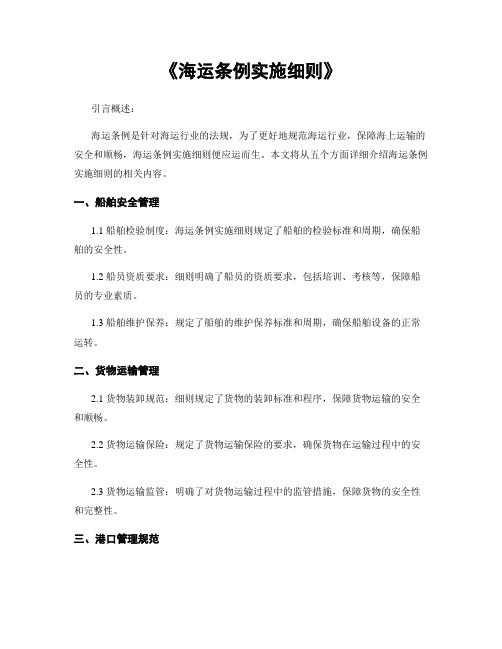
《海运条例实施细则》引言概述:海运条例是针对海运行业的法规,为了更好地规范海运行业,保障海上运输的安全和顺畅,海运条例实施细则便应运而生。
本文将从五个方面详细介绍海运条例实施细则的相关内容。
一、船舶安全管理1.1 船舶检验制度:海运条例实施细则规定了船舶的检验标准和周期,确保船舶的安全性。
1.2 船员资质要求:细则明确了船员的资质要求,包括培训、考核等,保障船员的专业素质。
1.3 船舶维护保养:规定了船舶的维护保养标准和周期,确保船舶设备的正常运转。
二、货物运输管理2.1 货物装卸规范:细则规定了货物的装卸标准和程序,保障货物运输的安全和顺畅。
2.2 货物运输保险:规定了货物运输保险的要求,确保货物在运输过程中的安全性。
2.3 货物运输监管:明确了对货物运输过程中的监管措施,保障货物的安全性和完整性。
三、港口管理规范3.1 港口设施维护:细则规定了港口设施的维护标准和周期,确保港口设施的正常运转。
3.2 港口作业规范:规定了港口作业的规范和程序,保障港口作业的安全和高效。
3.3 港口安全管理:明确了对港口安全管理的要求,确保港口的安全运营。
四、环保管理措施4.1 油污处理规范:细则规定了船舶油污处理的标准和程序,保护海洋环境的清洁。
4.2 垃圾处理要求:规定了船舶垃圾处理的要求,保护海洋环境的整洁。
4.3 燃油使用限制:明确了船舶燃油使用的限制,保护海洋环境的可持续发展。
五、应急响应机制5.1 事故报告程序:细则规定了船舶事故的报告程序和要求,确保及时有效地处理事故。
5.2 应急救援预案:规定了船舶应急救援预案的制定和实施,保障海上事故的应急处理。
5.3 事故调查处理:明确了对船舶事故的调查处理程序,保障相关责任的追究和整改。
总结:海运条例实施细则的出台,为海运行业的规范化管理提供了重要依据,有效保障了海上运输的安全和顺畅。
各方应严格遵守相关规定,共同维护海运行业的良好秩序。
国际船舶代理经营资格登记办事的指南
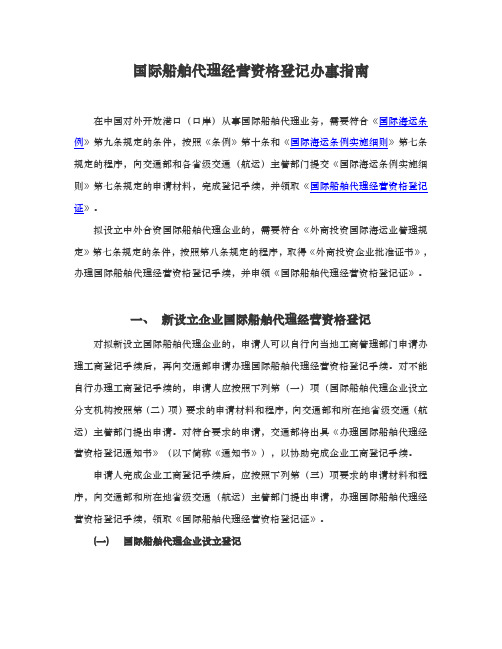
国际船舶代理经营资格登记办事指南在中国对外开放港口(口岸)从事国际船舶代理业务,需要符合《国际海运条例》第九条规定的条件,按照《条例》第十条和《国际海运条例实施细则》第七条规定的程序,向交通部和各省级交通(航运)主管部门提交《国际海运条例实施细则》第七条规定的申请材料,完成登记手续,并领取《国际船舶代理经营资格登记证》。
拟设立中外合资国际船舶代理企业的,需要符合《外商投资国际海运业管理规定》第七条规定的条件,按照第八条规定的程序,取得《外商投资企业批准证书》,办理国际船舶代理经营资格登记手续,并申领《国际船舶代理经营资格登记证》。
一、新设立企业国际船舶代理经营资格登记对拟新设立国际船舶代理企业的,申请人可以自行向当地工商管理部门申请办理工商登记手续后,再向交通部申请办理国际船舶代理经营资格登记手续。
对不能自行办理工商登记手续的,申请人应按照下列第(一)项(国际船舶代理企业设立分支机构按照第(二)项)要求的申请材料和程序,向交通部和所在地省级交通(航运)主管部门提出申请。
对符合要求的申请,交通部将出具《办理国际船舶代理经营资格登记通知书》(以下简称《通知书》),以协助完成企业工商登记手续。
申请人完成企业工商登记手续后,应按照下列第(三)项要求的申请材料和程序,向交通部和所在地省级交通(航运)主管部门提出申请,办理国际船舶代理经营资格登记手续,领取《国际船舶代理经营资格登记证》。
(一)国际船舶代理企业设立登记拟新设立企业从事国际船舶代理业务,申请领取《通知书》的,申请人应当向交通部提交下列申请材料,同时抄报所在地的省级交通(航运)主管部门:1、国际船舶代理企业设立登记申请书;2、可行性分析报告;3、投资协议;4、主要投资人的商业登记文件或者明;5、由工商行政管理部门出具的拟新设立企业《企业名称预先核准通知书》;6、指定(委托)书。
申请书及其他申请材料本请见本指南附件2。
有关省、自治区、直辖市人民政府交通(航运)主管部门收到上述抄报材料后起7个工作日,将就有关材料进行审核,提出意见,并将有关意见报送交通部。
中级经济师《水路运输经济》考点:我国国际航运政策
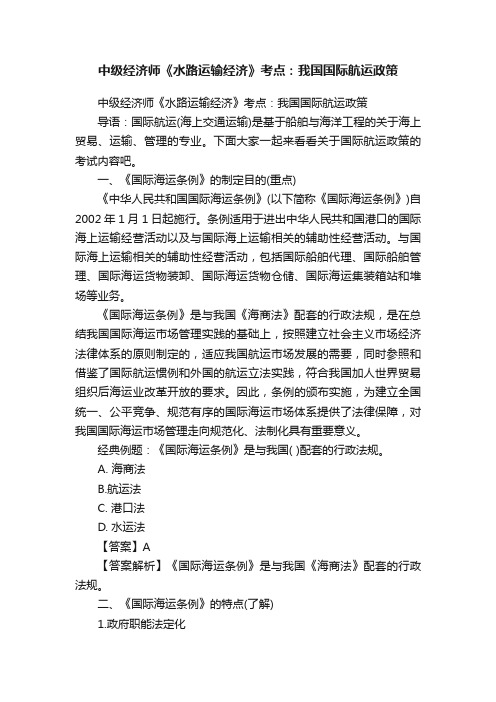
中级经济师《水路运输经济》考点:我国国际航运政策中级经济师《水路运输经济》考点:我国国际航运政策导语:国际航运(海上交通运输)是基于船舶与海洋工程的关于海上贸易、运输、管理的专业。
下面大家一起来看看关于国际航运政策的考试内容吧。
一、《国际海运条例》的制定目的(重点)《中华人民共和国国际海运条例》(以下简称《国际海运条例》)自2002年1月1日起施行。
条例适用于进出中华人民共和国港口的国际海上运输经营活动以及与国际海上运输相关的辅助性经营活动。
与国际海上运输相关的辅助性经营活动,包括国际船舶代理、国际船舶管理、国际海运货物装卸、国际海运货物仓储、国际海运集装箱站和堆场等业务。
《国际海运条例》是与我国《海商法》配套的行政法规,是在总结我国国际海运市场管理实践的基础上,按照建立社会主义市场经济法律体系的原则制定的,适应我国航运市场发展的需要,同时参照和借鉴了国际航运惯例和外国的航运立法实践,符合我国加人世界贸易组织后海运业改革开放的要求。
因此,条例的颁布实施,为建立全国统一、公平竞争、规范有序的国际海运市场体系提供了法律保障,对我国国际海运市场管理走向规范化、法制化具有重要意义。
经典例题:《国际海运条例》是与我国( )配套的行政法规。
A. 海商法B.航运法C. 港口法D. 水运法【答案】A【答案解析】《国际海运条例》是与我国《海商法》配套的行政法规。
二、《国际海运条例》的特点(了解)1.政府职能法定化条例明确规定了国务院交通主管部门和地方人民政府交通主管部门对国际海运市场的监管职责,体现了建设社会主义市场经济法律体系的要求,有利于推进交通主管部门的政府职能转变,是政府部门依法行政的重要法律依据。
条例规范市场准人程序,减少行政审批事项,取消或降低不必要的市场准人限制,有利于建立廉洁高效、运转协调、行为规范的海运业行政管理体制。
2.市场准入制度化在市场准人方面,条例规定除国际船舶运输业务实行许可证制度外,无船承运、国际班轮运输、国际船舶代理和国际船舶管理等业务均实行登记制。
中华人民共和国国际海运条例(2023年修订)
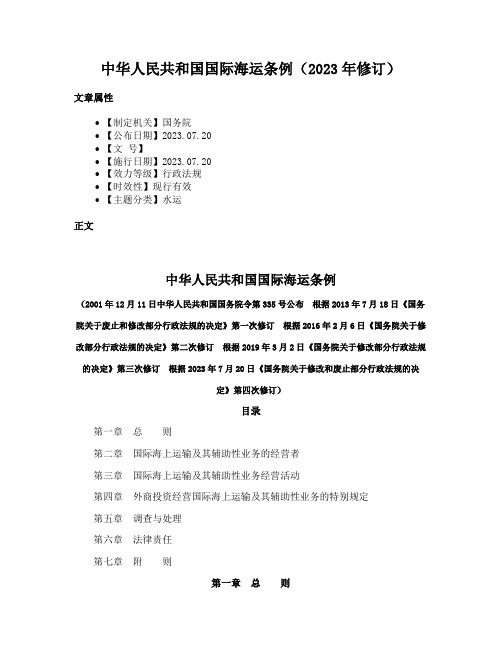
中华人民共和国国际海运条例(2023年修订)文章属性•【制定机关】国务院•【公布日期】2023.07.20•【文号】•【施行日期】2023.07.20•【效力等级】行政法规•【时效性】现行有效•【主题分类】水运正文中华人民共和国国际海运条例(2001年12月11日中华人民共和国国务院令第335号公布根据2013年7月18日《国务院关于废止和修改部分行政法规的决定》第一次修订根据2016年2月6日《国务院关于修改部分行政法规的决定》第二次修订根据2019年3月2日《国务院关于修改部分行政法规的决定》第三次修订根据2023年7月20日《国务院关于修改和废止部分行政法规的决定》第四次修订)目录第一章总则第二章国际海上运输及其辅助性业务的经营者第三章国际海上运输及其辅助性业务经营活动第四章外商投资经营国际海上运输及其辅助性业务的特别规定第五章调查与处理第六章法律责任第七章附则第一章总则第一条为了规范国际海上运输活动,保护公平竞争,维护国际海上运输市场秩序,保障国际海上运输各方当事人的合法权益,制定本条例。
第二条本条例适用于进出中华人民共和国港口的国际海上运输经营活动以及与国际海上运输相关的辅助性经营活动。
前款所称与国际海上运输相关的辅助性经营活动,包括本条例分别规定的国际船舶代理、国际船舶管理、国际海运货物装卸、国际海运货物仓储、国际海运集装箱站和堆场等业务。
第三条从事国际海上运输经营活动以及与国际海上运输相关的辅助性经营活动,应当遵循诚实信用的原则,依法经营,公平竞争。
第四条国务院交通主管部门和有关的地方人民政府交通主管部门依照本条例规定,对国际海上运输经营活动实施监督管理,并对与国际海上运输相关的辅助性经营活动实施有关的监督管理。
国务院交通主管部门和有关的地方人民政府交通主管部门应当对国际海上运输及其辅助性业务的经营者和从业人员实施信用管理,并将相关信用记录纳入全国信用信息共享平台。
第二章国际海上运输及其辅助性业务的经营者第五条经营国际客船、国际散装液体危险品船运输业务,应当具备下列条件:(一)取得企业法人资格;(二)有与经营业务相适应的船舶,其中必须有中国籍船舶;(三)投入运营的船舶符合国家规定的海上交通安全技术标准;(四)有提单、客票或者多式联运单证;(五)有具备国务院交通主管部门规定的从业资格的高级业务管理人员。
交通部颁布无船承运业务细则的公告
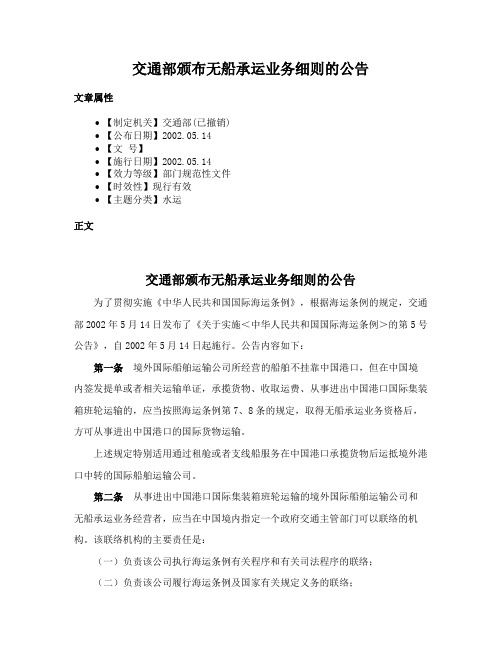
交通部颁布无船承运业务细则的公告文章属性•【制定机关】交通部(已撤销)•【公布日期】2002.05.14•【文号】•【施行日期】2002.05.14•【效力等级】部门规范性文件•【时效性】现行有效•【主题分类】水运正文交通部颁布无船承运业务细则的公告为了贯彻实施《中华人民共和国国际海运条例》,根据海运条例的规定,交通部2002年5月14日发布了《关于实施<中华人民共和国国际海运条例>的第5号公告》,自2002年5月14日起施行。
公告内容如下:第一条境外国际船舶运输公司所经营的船舶不挂靠中国港口,但在中国境内签发提单或者相关运输单证,承揽货物、收取运费、从事进出中国港口国际集装箱班轮运输的,应当按照海运条例第7、8条的规定,取得无船承运业务资格后,方可从事进出中国港口的国际货物运输。
上述规定特别适用通过租舱或者支线船服务在中国港口承揽货物后运抵境外港口中转的国际船舶运输公司。
第二条从事进出中国港口国际集装箱班轮运输的境外国际船舶运输公司和无船承运业务经营者,应当在中国境内指定一个政府交通主管部门可以联络的机构。
该联络机构的主要责任是:(一)负责该公司执行海运条例有关程序和有关司法程序的联络;(二)负责该公司履行海运条例及国家有关规定义务的联络;(三)负责有关法律文件和政府文书的送达。
有关法律文件和政府文书送达联络机构之后的合理时间内,即表明该公司已收到该类文件或文书。
指定的联络机构应当在中国境内有固定的住所。
在华设立有独资船务公司的境外国际船舶运输公司,如果没有特别申明,该独资船务公司即为其联络机构,不须另外指定;其他境外国际船舶运输公司在不同港口委托有多家国际船舶代理公司的,应当指定其中一家为联络机构。
境外国际船舶运输公司和无船承运业务经营者的在华代表(办事)处,可以担任该公司的联络机构,但须指定。
境外国际船舶运输公司和无船承运业务经营者,应当在申请资格登记时,将联络机构的名称、住所及联系方式、公司与联络机构的协议或委托书副本等,向交通部备案。
国家铁路局解读取消和下放行政许可所涉及的规章修正案

国家铁路局解读取消和下放行政许可所涉及的规章修正案文章属性•【公布机关】交通运输部•【公布日期】2014.07.15•【分类】法规、规章解读正文解读取消和下放行政许可所涉及的规章修正案国务院目前共发布了四批行政许可清理决定,其中涉及我部职责是取消行政许可11项,下放6项。
为贯彻落实国务院关于行政审批制度改革的要求,按照国务院发布的取消、下放行政审批项目的决定,我部对涉及的部门规章进行了清理和修订、废止。
其中以修正案形式完成了11件次规章的修订工作,废止了6件铁路规章。
现对其中主要的修正案和废止情况作如下解读:一、关于《中华人民共和国国际海运条例实施细则》等4件规章的修订国务院以国发[2013]19号文公布的第一批取消和下放的行政许可项目中,涉及我部的是取消了5项审批项目,设立这5项行政审批项目的3件行政法规《国际海运条例》、《防治船舶污染海洋环境管理条例》、《船员条例》已做了相应修改,删除了相关条文。
按照国务院要求,所涉及的规章也要相应地修改。
(一)关于《国际海运条例实施细则》(交通部令2003年第1号)的修订这部规章的修订主要是针对取消的“国际船舶代理业务审批”和“国际船舶运输经营者之间兼并、收购审核”两个许可项目。
一是将国际船舶代理业务由事前审批改为了事后备案,并按照确保行业管理不缺位、市场秩序不混乱的要求,将原来的许可条件内容以行为规范和管理要求的形式予以了保留;二是删除了“国际船舶运输经营者之间兼并、收购审核”的条款。
另外,“对外国国际船舶运输经营者及外国国际海运辅助企业在华设立常驻代表机构审批”是此前国务院清理行政许可时予以取消的,此次修订一并删除了这一许可项目的相应条款。
该规章修正案以交通运输部2013年第9号部令公布。
(二)关于《船员服务管理规定》(交通运输部令2008年第6号)的修订该规章的修订针对的是“从事内河船舶船员服务业务审批”许可项目的取消。
主要是将内河船舶船员服务机构由审批制管理调整为备案制管理,并在罚则中对未按规定备案的情形明确了相应的处罚。
中华人民共和国船舶登记办法
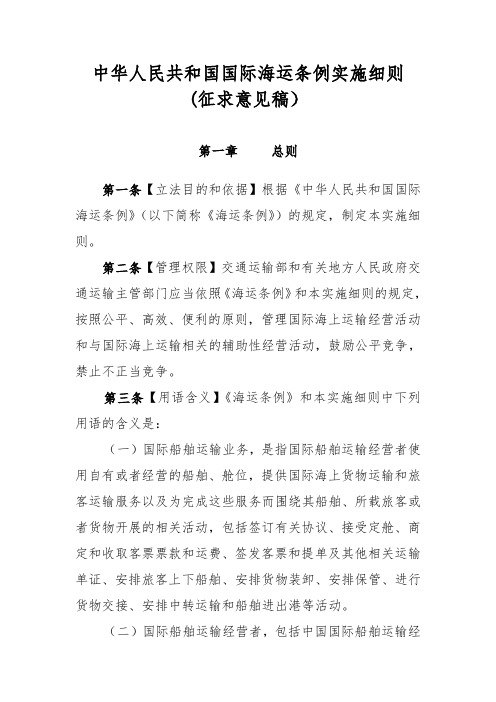
中华人民共和国国际海运条例实施细则(征求意见稿)第一章总则第一条【立法目的和依据】根据《中华人民共和国国际海运条例》(以下简称《海运条例》)的规定,制定本实施细则。
第二条【管理权限】交通运输部和有关地方人民政府交通运输主管部门应当依照《海运条例》和本实施细则的规定,按照公平、高效、便利的原则,管理国际海上运输经营活动和与国际海上运输相关的辅助性经营活动,鼓励公平竞争,禁止不正当竞争。
第三条【用语含义】《海运条例》和本实施细则中下列用语的含义是:(一)国际船舶运输业务,是指国际船舶运输经营者使用自有或者经营的船舶、舱位,提供国际海上货物运输和旅客运输服务以及为完成这些服务而围绕其船舶、所载旅客或者货物开展的相关活动,包括签订有关协议、接受定舱、商定和收取客票票款和运费、签发客票和提单及其他相关运输单证、安排旅客上下船舶、安排货物装卸、安排保管、进行货物交接、安排中转运输和船舶进出港等活动。
(二)国际船舶运输经营者,包括中国国际船舶运输经营者和外国国际船舶运输经营者。
其中,中国国际船舶运输经营者是指依据《海运条例》和本实施细则规定取得《国际船舶运输经营许可证》经营国际船舶运输业务的中国企业法人;外国国际船舶运输经营者是指依据外国法律设立经营进出中国港口国际船舶运输业务的外国企业。
(三)国际班轮运输业务,是指以自有或者经营的船舶,或者以《海运条例》第十三条第三款规定的方式,在固定的港口之间提供的定期国际海上货物或旅客运输。
(四)无船承运业务,是指《海运条例》第七条第二款规定的业务,包括为完成该项业务围绕其所承运的货物开展的下列活动:(1)以承运人身份与托运人订立国际货物运输合同;(2)以承运人身份接收货物、交付货物;(3)签发提单或者其他运输单证;(4)收取运费及其他服务报酬;(5)向国际船舶运输经营者或者其他运输方式经营者为所承运的货物订舱和办理托运;(6)支付运费或者其他运输费用;(7)集装箱拆箱、集拼箱业务;(8)其他相关的业务。
中华人民共和国海上国际集装箱运输管理规定实施细则
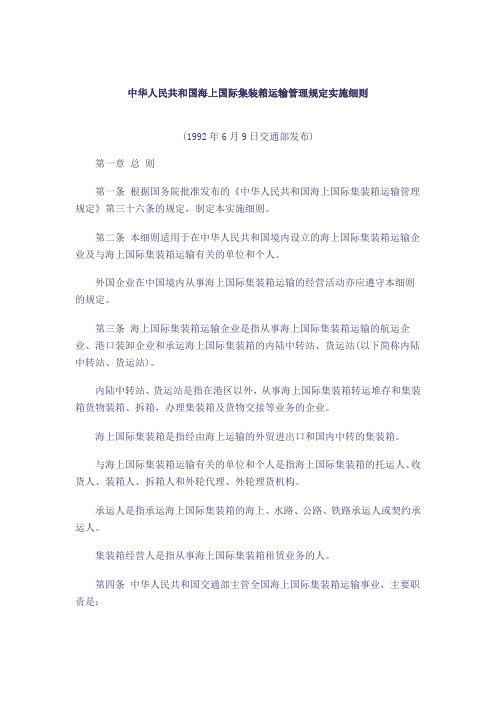
中华人民共和国海上国际集装箱运输管理规定实施细则(1992年6月9日交通部发布)第一章总则第一条根据国务院批准发布的《中华人民共和国海上国际集装箱运输管理规定》第三十六条的规定,制定本实施细则。
第二条本细则适用于在中华人民共和国境内设立的海上国际集装箱运输企业及与海上国际集装箱运输有关的单位和个人。
外国企业在中国境内从事海上国际集装箱运输的经营活动亦应遵守本细则的规定。
第三条海上国际集装箱运输企业是指从事海上国际集装箱运输的航运企业、港口装卸企业和承运海上国际集装箱的内陆中转站、货运站(以下简称内陆中转站、货运站)。
内陆中转站、货运站是指在港区以外,从事海上国际集装箱转运堆存和集装箱货物装箱、拆箱,办理集装箱及货物交接等业务的企业。
海上国际集装箱是指经由海上运输的外贸进出口和国内中转的集装箱。
与海上国际集装箱运输有关的单位和个人是指海上国际集装箱的托运人、收货人、装箱人、拆箱人和外轮代理、外轮理货机构。
承运人是指承运海上国际集装箱的海上、水路、公路、铁路承运人或契约承运人。
集装箱经营人是指从事海上国际集装箱租赁业务的人。
第四条中华人民共和国交通部主管全国海上国际集装箱运输事业,主要职责是:(一)制定有关海上国际集装箱运输的方针政策和发展规划并监督实施;(二)制定有关海上国际集装箱运输的规章、技术规范和标准并监督执行;(三)对海上国际集装箱运输企业实施行业管理;(四)组织国家指令性运输计划的实施;(五)开展国际经济技术交流与合作;(六)协调与海上国际集装箱运输有关各方的业务关系。
第二章企业开业、变更与终止第五条设立经营海上国际集装箱运输的航运企业,应经当地省、自治区、直辖市交通主管部门审核,报交通部审批。
但设立经营珠江(不含港澳线)、长江、黑龙江水系干线运输的航运企业,由交通部派驻水系的航务 (运)管理局审批。
第六条在地方所属港口设立港口国际集装箱装卸企业,应经当地省、自治区、直辖市交通主管部门审批,报交通部备案。
国际货物运输代理业管理规定实施细则

国际货物运输代理业管理规定实施细则集团标准化工作小组 #Q8QGGQT-GX8G08Q8-GNQGJ8-MHHGN#中华人民共和国国际货物运输代理业管理规定实施细则目录第一章总则第一条为维护国际货运代理市场秩序,加强对国际货运代理业的监督管理,促进我国国际货运代理业的健康发展,经国务院批准、根据原外经贸部1995年6月29日发布的《中华人民共和国国际货物运输代理业管理规定》(以下简称《规定》)制订本细则。
第二条国际货物运输代理企业(以下简称国际货运代理企业)可以作为进出口货物收货人、发货人的代理人,也可以作为独立经营人,从事国际货运代理业务。
国际货运代理企业作为代理人从事国际货运代理业务,是指国际货运代理企业接受进出口货物收货人、发货人或其代理人的委托,以委托人名义或者以自己的名义办理有关业务,收取代理费或佣金的行为。
国际货运代理企业作为独立经营人从事国际货运代理业务,是指国际货运代理企业接受进出口货物收货人、发货人或其代理人的委托,签发运输单证、履行运输合同并收取运费以及服务费的行为。
第三条国际货运代理企业的名称、标志应当符合国家有关规定,与其业务相符合,并能表明行业特点,其名称应当含有"货运代理"、"运输服务"、"集运"或"物流"等相关字样。
第四条《规定》第四条第二款中"授权的范围"是指省、自治区、直辖市、经济特区、计划单列市人民政府商务主管部门在商务部的授权下,负责对本行政区域内国际货运代理业实施监督管理(商务部和地方商务主管部门以下统称行业主管部门),该授权范围包括:对企业经营国际货运代理业务项目申请的初审、国际货运代理企业的年审和换证审查、业务统计、业务人员培训、指导地方行业协会开展工作以及会同地方有关行政管理部门规范货运代理企业经营行为、治理货运代理市场经营秩序等工作。
国务院部门直属企业和异地企业在计划单列市(不含经济特区)设立的国际货运代理子公司、分支机构及非营业性办事机构,根据前款的授权范围,接受省商务主管部门的监督管理。
《海运条例实施细则》
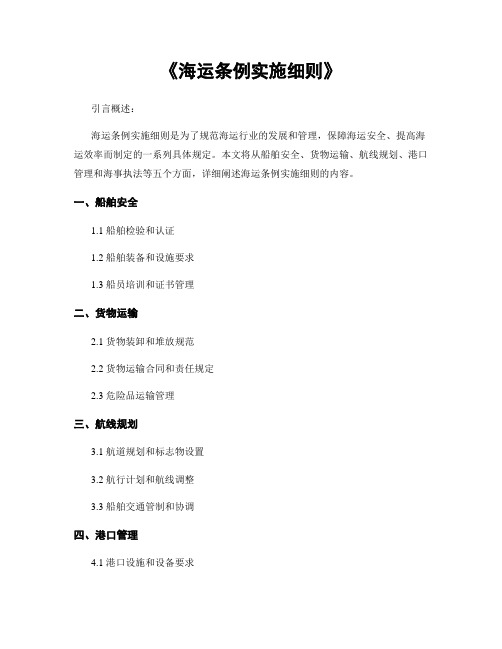
《海运条例实施细则》引言概述:海运条例实施细则是为了规范海运行业的发展和管理,保障海运安全、提高海运效率而制定的一系列具体规定。
本文将从船舶安全、货物运输、航线规划、港口管理和海事执法等五个方面,详细阐述海运条例实施细则的内容。
一、船舶安全1.1 船舶检验和认证1.2 船舶装备和设施要求1.3 船员培训和证书管理二、货物运输2.1 货物装卸和堆放规范2.2 货物运输合同和责任规定2.3 危险品运输管理三、航线规划3.1 航道规划和标志物设置3.2 航行计划和航线调整3.3 船舶交通管制和协调四、港口管理4.1 港口设施和设备要求4.2 港口作业和服务规范4.3 港口安全和环境保护措施五、海事执法5.1 海事执法机构和职责5.2 违法行为和处罚规定5.3 申诉和仲裁机制正文内容:一、船舶安全1.1 船舶检验和认证海运条例实施细则要求对船舶进行定期检验和认证,确保船舶符合国际和国内安全标准。
检验内容包括船体结构、船舶设备、消防系统、航行安全装备等方面。
认证机构负责对船舶进行审核和认证,确保船舶满足安全运行的要求。
1.2 船舶装备和设施要求海运条例实施细则规定了船舶装备和设施的要求,包括船舶通信设备、导航设备、救生设备等。
船舶必须配备符合规定的装备和设施,以确保船舶在航行过程中的安全性和可靠性。
1.3 船员培训和证书管理海运条例实施细则要求船员必须接受相应的培训,并持有相应的证书。
船员培训包括船舶安全知识、应急处置等方面,证书管理包括证书的颁发、更新和管理等。
这些要求旨在提高船员的专业素质和应对突发情况的能力。
二、货物运输2.1 货物装卸和堆放规范海运条例实施细则规定了货物的装卸和堆放规范,包括货物的包装、固定、标识等要求。
这些规范旨在确保货物在运输过程中不受损坏,并提高货物装卸的效率。
2.2 货物运输合同和责任规定海运条例实施细则明确了货物运输合同的内容和责任规定,包括托运人、承运人和收货人的权利和义务。
交通部关于对《中华人民共和国水路运输管理条例》及其实施细则若干条款解释的通知-[88]交河字117号
![交通部关于对《中华人民共和国水路运输管理条例》及其实施细则若干条款解释的通知-[88]交河字117号](https://img.taocdn.com/s3/m/b2b34600974bcf84b9d528ea81c758f5f71f2946.png)
交通部关于对《中华人民共和国水路运输管理条例》及其实施细则若干条款解释的通知正文:---------------------------------------------------------------------------------------------------------------------------------------------------- 交通部关于对《中华人民共和国水路运输管理条例》及其实施细则若干条款解释的通知(1988年2月16日(88)交河字117号)国务院发布的《中华人民共和国水路运输管理条例》(以下简称《条例》)及部发布的《水路运输管理条例实施细则》(以下简称《细则》)自一九八七年十月一日施行以来,在各级政府的领导下,各级交通主管部门正在认真贯彻执行,全国水路运输的行业管理工作也在逐步展开。
最近,我部在上海市召开了贯彻两项法规座谈会,沿海及长江、珠江、黑龙江水系十九个省、自治区、直辖市交通厅(局)和主要航运管理机构的代表参加了会议,并汇报了三个多月来的施行情况,协调了行业管理的进行步骤,研究了存在的问题。
为了对这两项重要法规有一个统一的认识,便于正确施行,特针对会议讨论的二十四个问题,研究整理成《关于〈中华人民共和国水路运输管理条例〉及实施细则中若干条款的解释》(第一次),发给你们,请传达到各级航管机构。
关于《中华人民共和国水路运输管理条例》及其实施细则中若干条款的解释(第一次)一、关于两项法规的适用范围问题。
根据《条例》第二条规定的原则,在我国沿海、江河、湖泊及其他通航水域内从事水路运输和水路运输服务业务的单位和个人均适用本法规的规定。
在制定本条例的实施细则时,考虑到我国水域辽阔、船舶众多而分散的实际情况,为有利于具体实施,特在第二条中,将适用范围分列三项,区别对待,即“本细则适用于:(一)一切从事水路营业性旅客、货物运输(含旅游、渡船运输,下同)的企业、其他单位和个人;(二)一切从事水路运输服务业务的企业;(三)石油、煤炭、冶金、商业(含粮食)、供销、外贸、林业、电力、化工、水产以及其他对水路运输行业管理影响较大的部门从事的非营业性运输。
国际海运条例
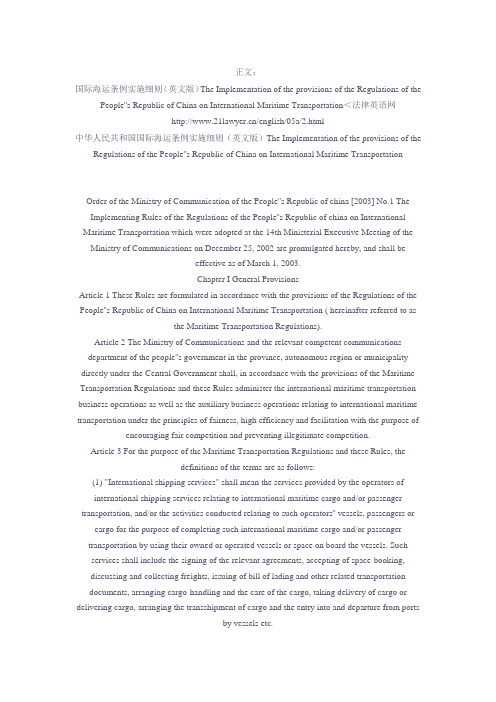
正文:国际海运条例实施细则(英文版)The Implementation of the provisions of the Regulations of the People''s Republic of China on International Maritime Transportation<法律英语网/english/05a/2.html中华人民共和国国际海运条例实施细则(英文版)The Implementation of the provisions of the Regulations of the People''s Republic of China on International Maritime TransportationOrder of the Ministry of Communication of the People''s Republic of china [2003] No.1 The Implementing Rules of the Regulations of the People''s Republic of china on International Maritime Transportation which were adopted at the 14th Ministerial Executive Meeting of the Ministry of Communications on December 25, 2002 are promulgated hereby, and shall beeffective as of March 1, 2003.Chapter I General ProvisionsArticle 1 These Rules are formulated in accordance with the provisions of the Regulations of the People''s Republic of China on International Maritime Transportation ( hereinafter referred to asthe Maritime Transportation Regulations).Article 2 The Ministry of Communications and the relevant competent communications department of the people''s government in the province, autonomous region or municipality directly under the Central Government shall, in accordance with the provisions of the Maritime Transportation Regulations and these Rules administer the international maritime transportation business operations as well as the auxiliary business operations relating to international maritime transportation under the principles of fairness, high efficiency and facilitation with the purpose of encouraging fair competition and preventing illegitimate competition.Article 3 For the purpose of the Maritime Transportation Regulations and these Rules, thedefinitions of the terms are as follows:(1) "International shipping services" shall mean the services provided by the operators ofinternational shipping services relating to international maritime cargo and/or passenger transportation, and/or the activities conducted relating to such operators'' vessels, passengers or cargo for the purpose of completing such international maritime cargo and/or passenger transportation by using their owned or operated vessels or space on board the vessels. Such services shall include the signing of the relevant agreements, accepting of space-booking, discussing and collecting freights, issuing of bill of lading and other related transportation documents, arranging cargo-handling and the care of the cargo, taking delivery of cargo or delivering cargo, arranging the transshipment of cargo and the entry into and departure from portsby vessels etc.(2) "Operators of international shipping services" shall include the Chinese enterprise legalpersons who have acquired the Permits for Operation of International Shipping Services for operating the international shipping services according to the Maritime Transportation Regulations, or foreign enterprises established in accordance with foreign laws who operate the internationalshipping services to and from Chinese ports.(3) "International liner services" shall mean the regular international maritime cargo/or passenger transportation services provided between the fixed ports by means of using the owned or operated vessels or by means of the cases specified in paragraph 3, Article 16 of the MaritimeTransportation Regulations.(4) "Non-vessel-operating services" shall mean the services provided in paragraph 2, Article 7 of the Maritime Transportation Regulations, including the following activities conducted relating to the cargo transported for the purpose of completing such services :a. concluding international cargo transportation contracts with the shippers in the name of carriers;b. taking delivery of cargo and delivering cargo in the name of carriers;c. issuing bills of lading or other transportation documents;d. collecting freight and other service charges;e. booking space from operators of international shipping services or contracting with operators ofother means of transportation for cargo transportation;f. paying the freight of port to port transportation or other transportation charges;g. unstuffing and/or cargo container consolidation;h. other related activities.(5) "A non-vessel-operating common carrier" shall include a Chinese enterprise legal person who has acquired the license for the non-vessel-operating services in accordance with the Maritime Transportation Regulations and these Rules, and a foreign enterprise established in accordance with foreign laws or regulations who has acquired the qualification in accordance with the Maritime Transportation Regulations and these Rules for non-vessel-operating services for cargoto and from Chinese ports.(6) "An international shipping agent" shall mean a Chinese enterprise legal person established in accordance with Chinese laws who provides the services as specified in Article 29 of the MaritimeTransportation Regulations.(7) "An international ship management operator" shall mean a Chinese enterprise legal person established in accordance with Chinese laws who provides the services as specified in Article 30of the Maritime Transportation Regulations.(8) "An operator of the business relating to storage and warehousing of international shipments" shall mean a Chinese enterprise legal person established in accordance with Chinese laws who provides the services of cargo storage and custody in warehouses, cargo inventory management, as well as sorting and packing, repacking and distributing of cargo etc.(9) "An operator of international maritime container freight station and container yard services" shall mean a Chinese enterprise legal person established in accordance with Chinese laws who provides the storage, custody, cleaning, repairing of containers as well as the storage,consolidation, distribution of container cargo.(10) "A foreign-invested enterprise shall mean a Chinese-foreign equity joint venture, a Chinese-foreign contractual joint venture or a wholly foreign capital enterprise established inaccordance with Chinese laws.(11) "A foreign-invested representative office" shall mean a non-commercial organization established according to laws within Chinese territory by a foreign enterprise or another economic organization which conducts introduction of business, sales promotion, business consultation and the liaison services for such a foreign enterprise or economic organization.(12) "Business registration documents of an enterprise" shall mean the business license or thedocuments certifying the registration of an enterprise issued by the enterprises registration authority or the relevant authority of the country where the enterprise was registered. Where the photocopies of such business registration documents are submitted, a confirmation on such photo-copies about the truthfulness of such photocopies by the registration authority or notary documents certifying the identity between the photocopies and the originals shall be provided atthe same time.(13) "A special-purpose invoice" shall mean the bills approved and uniformly printed by the State Administration of Taxation. It is a receipt which certifies the payment of the freights or other related charges by the payer to the operator of international shipping services or its agents, or to the non-vessel-operating carrier or its agents. Such an invoice shall include the Special Invoice for International Shipping and the Special Invoice for International Shipping Agency. (14) "An agreement of liner conference" shall mean the kind of agreement concluded betweenmembers of a liner conference or between liner conferences, which is defined in the UN Convention on A Code of Conduct for Liner Conferences, 1974.(15) "An operational agreement" shall mean an agreement relating to the increase or decrease ofshipping capacity in one or more shipping routes concluded between two or more than two international operators of international liner services for the purpose of stabilizing or controlling the freight rates, or other agreement coordination the joint efforts of operators of international liner ser-vices. Such an agreement includes the agreed minutes with the natures of the above-mentioned agreement. Such an agreement shall also mean the agreement relating to the joint operation of the vessels, joint usage of the port facilities and other cooperative operation agreement and various kinds of alliance or consortia agreements concluded between two or more than two operators of international liner services for the purpose of improving the operationalefficiency.(16) "A freight rate agreement" shall mean an agreement relating to the kinds of charges to becollected, the rates thereof, the freight rates or surcharges etc. which is concluded between two or more than two operators of international liner services. Such an agreement shall also include the agreed minutes with the natures of the above-mentioned agreement.(17) "Tariff rates" refer to the freight rates provided in the tariff book of international liner services operators and non-vessel-operating common carriers. Such rates include the freight rates, the rules related to the freight rates and the rules which shall be complied with both by carriers andshippers.(18) "Negotiated rates" refer to the freight rates agreed upon between international liner servicesoperators and shippers or non-vessel-operating common carriers. Such rates shall include the freight rates and the related elements. Negotiated rates shall be concluded in the form of writtencontracts or agreements.(19) "Documents certifying the business experience" refer to the curriculum vitae certifying thatthe person to be certified has more than three years'' experience in the international shipping services and the auxiliary businesses thereof. The curriculum vitae shall be notarized by a notaryoffice.Chapter II Operators of International Shipping Services and Auxiliary Businesses thereof Article 4 The criteria specified in Article 5 in the Maritime Transportation Regulations shall be satisfied and the policies of the State for the development of international shipping industry and the actual competition situations in international shipping market issued by the Ministry of Communications shall be considered before an enterprise can be set up within the Chinese territory to operate the international shipping services or before a Chinese enterprise legal person can apply to operate the international shipping services.The Ministry of Communications shall publish the policies of the State for the development of international shipping industry and the actual competition situations in international shipping market at its official website and the other appropriate media. Where the above-mentioned policies or situations fail to be published, they shall not be used as the reasons for the refusal ofapplications.Article 5 The applicant shall make an application and submit the relevant documents to the Ministry of Communications for applying to set up an enterprise within the Chinese territory to operate international shipping services, or, for applying to operate international shipping services when such an applicant is a Chinese enterprise legal person. A duplicate of the same documents shall be sent to the competent communications department of the people''s government of the province, autonomous region or municipality directly under the Central Government where the enterprise is or is to be registered, as the case may be. The following application documents shallbe included:(1) the letter of application;(2) the feasibility study report and the agreement of investment;(3) the business registration document of the applicant (if applying to set up an enterprise, the main investor''s business registration document or, as the case may be, the identity document) ;(4) the duplicate or photocopy of the vessel''s ownership document, nationality document orinspection document;(5) the sample of bill of lading, passage ticket or multi-modal transport documents; and(6) the documents certifying the business experience of the senior executives who satisfy therequirements of the Ministry of Communications.The competent communications department of the people''s government of the province, autonomous region or municipality directly under the Central Government shall give its comments thereon upon the acceptance of the documents and submit its comments to the Ministry ofCommunications within 10 working days from the date of acceptance of the application.The Ministry of Communications shall, within 30 working days from the date when the application documents are complete and authentic, complete the examination and verification and make a decision of granting or not granting permission in accordance with Article 5 and 6 of the Maritime Transportation Regulations. If the permission is granted, a Permit for Operation of International Shipping Services shall be issued to the applicant, or, if no permission is granted, the applicant shall be notified in writing and given the reasons therefor.Article 6 If a Chinese operator of international shipping services applies to set up a branch within Chinese territory, the provisions relating to the procedures as specified in Article 5 of these Rules shall apply. The following application documents shall be included:(1) the letter of application;(2) the feasibility study report;(3) the business registration document of the parent company;(4) the photocopy of the Permit for Operation of International Shipping Services of the parentcompany;(5) the letter of confirmation by the parent company of the business scope of the branch; and(6) the documents certifying the business experience of the senior executives who satisfy therequirement of the Ministry of Communications.The branches of the Chinese operators of international shipping services may provide the services to the vessels of the parent company with regard to port entry and departure, arranging for the port handling, accepting of space booking, issuing of bill of lading and collecting of freight etc. Article 7 If applying to set up of an enterprise legal person within Chinese territory to operate international shipping agency services or to operate international shipping agency services, an application shall be submitted to the Ministry of Communications, and the relevant documents shall be attached thereto. The same documents shall be submitted to the competent communications department of the people''s government of the province, autonomous region or municipality directly under the Central Government where the enterprise is or is to be registered,as the case may be. The application documents shall include the following:(1) the letter of application;(2) the feasibility study report and the agreement of investment;(3) the business registration document of the applicant (if applying to set up an enterprise, the main investor''s business registration document or, as the case may be, the identity document) ;(4) the document certifying that there is a fixed place of business;(5) the documents certifying the business experience of the senior executives as specified insubparagraph 1 of Article 9 of the Maritime Transportation Regulations; and(6) the agreement of having EDI with the ports and customs etc. If there is no such EDI arrangement, the certifying document issued by the relevant port or customs shall be provided.The competent communications department of the people''s government of the province, autonomous region or municipality directly under the Central Government shall give its comments thereon upon the acceptance of the documents and submit its comments to the Ministry ofCommunications within 7 working days from the date of acceptance of the application.The Ministry of Communications shall, within 15 working days from the date when the application documents are complete and authentic, complete the examination and verification in accordance with Article 9 of the Maritime Transportation Regulations. If the applicationdocuments are examined and verified as qualified, the registration shall be granted and a Registration for Operation of International Shipping Agency Services shall be issued to the applicant. If the application documents are examined and verified as unqualified, the applicant shall be notified in writing and given the reasons therefor. The applicant shall, go through the enterprise registration procedures at the enterprise registration authority by holding the Registration for Operation of International Shipping Agency Services issued by the Ministry of Communications and the relevant procedures at the customs, taxation and foreign exchangeadministration authorities.Article 8 If a Chinese enterprise legal person applies to operate international ship management services or to set up an enterprise within Chinese territory to operate international shipmanagement services, an application shall be submitted to the competent communications department of the people''s government of the province, autonomous region or municipality directly under the Central Government. The following application documents shall be included:(1) the letter of application;(2) the feasibility study report and the agreement of investment;(3) the business registration document of the applicant (in case of applying to set up an enterprise, the main investor''s business registration document or, as the case may be, the identity document) ;(4) the document certifying that there is a fixed place of business;(5) the documents certifying the business experience of the senior executives as specified insubparagraph 1 of Article 11 of the Maritime Transportation Regulations; and(6) the photocopies of the master, the chief engineer''s documents of competence as specified insubparagraph 2 of Article 11 of the Maritime Transportation Regulations.The competent communications department of the people''s government of the province, autonomous region or municipality directly under the Central Government shall, within 15 working days from the date when the application documents are complete and authentic, complete the examination and verification. If the application documents are examined as authentic and satisfy the provisions in Article 11 of the Maritime Transportation Regulations, the registration shall be granted and a Registration for Operation of Auxiliary Businesses Relating to International Maritime Transportation shall be issued to the applicant. If the application documents are examined and verified as inauthentic or if the application fails to satisfy the conditions specified in Article 11 of the Maritime Transportation Regulations, no registration shall be granted and the applicant shall be notified in writing and given the reasons therefor. The applicant shall, go through the enterprise registration procedure at the enterprise registration authority, the relevant procedures at the taxation authority and the banks designated by the foreign exchange administration authority with the Registration for Operation of Auxiliary Businesses Relating toInternational Maritime Transportation.Article 9 If the branches set up by the operators of international shipping agency services and international ship management services within Chinese territory to operate the relevant services, the criteria specified in Article 9 and 11 of the Maritime Transportation Regulations shall be satisfied and registration shall be conducted in accordance with the provisions in Article 10 and 12 of the Maritime Transportation Regulations, Article 7 and 8 of these Rules. The followingdocuments for registration shall be included :(1) the letter of application;(2) the feasibility study report;(3) the business registration document of the parent company;(4) the photocopies of Registration for Operation of International Shipping Agency Services orRegistration for Operation of Auxiliary Businesses Relating to International MaritimeTransportation of the parent company;(5) the letter of confirmation by the parent company of the business scope of the branch;(6) the document certifying that there is a fixed place of business;(7) the documents certifying the business experience of staff as specified Article 9 and 11 of theMaritime Transportation Regulations; and(8) the EDI agreement with the port and the customs authorities in case of setting up branches by an operator of international shipping agency services. If there is no EDI capability, the relevant certifying document issued by the port or the customs authority shall be submitted.Article 10 An application and the documents specified in Article 17 of the Maritime Transportation Regulations shall be submitted to the Ministry of Communications when anoperator of international shipping services applies to engage in the international liner services to and from Chinese ports. The Ministry of Communications shall carry out the examination and verification as specified in Article 17 of the Maritime Transportation Regulations. If a registration is granted, a Registration of International liner Services Qualification shall be issued. If no registration is granted when the application documents are inauthentic and incomplete, the applicant shall be notified in writing and given the reasons therefor.The Ministry of Communications will list the name of the operator of the international liner services and the bill of lading thereof at its official website after the operator of international shipping services has acquired the qualification for engagement of the international liner servicesto and from Chinese ports.Article 11 An application and the relevant documents shall be submitted to the Ministry of Communications in case of applying for the registration of a non-vessel-operating common carrier''s bill of lading. A duplicate of the above-mentioned documents shall be submitted at the same time to the competent communications department of the people''s government of the province, autonomous region, municipality directly under the Central Government where the non-vessel-operating common carrier is registered, or, in case of application for registration of a bill of lading by a foreign non-vessel-operating common carrier, to the competent communications department of the people''s government of the province, autonomous region or municipality directly under the Central Government where the liaison office appointed by suchnon-vessel-operating common carrier is registered. The following application documents shall beincluded:(1) the letter of application;(2) the feasibility study report;(3) the business registration document;(4) the sample of bill of lading;(5) the photocopy of the receipt certifying that the surety bond has been deposited at the bank.If the applicant is a foreign non-vessel-operating common carrier, the relevant documents specified in Article 25 of these Rules which relate to its appointed liaison office shall be submittedas well.The competent communications department of the people''s government of the province, autonomous region or municipality directly under the Central Government shall complete the examination, verification and give its comments on the application documents after the acceptance of the above-mentioned duplicate. Such communications department shall report its comments to the Ministry of Communications within 7 working days after the acceptance of the applicationdocuments.The Ministry of Communications shall complete the examination and verification specified in Article 7 and 8 in the Maritime Transportation Regulations within 15 working days after theacceptance of the complete application documents. If the application documents are authentic and complete, the registration of the bill of lading shall be granted and a Registration ofNon-Vessel-Operating Services Qualification shall be issued. If the application documents are inauthentic and incomplete, the applicant shall be notified in writing that no registration is grantedand the reasons therefor shall be given.After acquiring a Registration of Non-Vessel-Operating Services Qualification, a Chinese applicant shall go through the registration procedure at the enterprise registration authority where it is registered before starting the non-vessel-operating services.Article 12 If a foreign non-vessel-operating common carrier has acquired the qualification for the non-vessel-operating services in accordance with foreign laws and has obtained a legal financial liability guaranty, it does not need to deposit the surety bond at the bank within Chinese territory when it applies to engage in the non-vessel-operating services to and from Chinese ports in accordance with the Maritime Transportation Regulations and these Rules. However, in order to ensure that the debt to be paid which is incurred from the foreign non-vessel-operating common carrier''s non-performance or improper performance of the carrier''s responsibility, or, in order to ensure that the fine to be paid which is incurred from such non-vessel-operating common carrier''s non-performance or improper performance satisfy the provisions in paragraph 3 of Article 8 of the Maritime Transportation Regulations, the competent authority of such a foreignnon-vessel-operating common carrier shall sign an agreement relating to the ways or means of realizing the financial liability guaranty with the Chinese governmental transport authority. Article 13 When the cargo is solicited, the bill of lading or other transport document is issued, or the freight is collected within Chinese territory, although there is no direct international liner services to and from Chinese ports, the qualification of the non-vessel-operating services shall be obtained in accordance with the relevant provisions of these Rules if the international cargo transportation services to and from Chinese ports is provided by way of chartering space from vessels of operators of international liner services, or, if cargo is shipped at Chinese ports for transshipment at foreign ports by using the feeder service provided by operators of international liner services, with the exception of the cases specified in paragraph 3 of Article 16 of theMaritime Transportation Regulations.Article 14 If a Chinese non-vessel-operating common carrier applies to set up a branch within Chinese territory, the surety bond shall be deposited in accordance with paragraph 2 of Article 8 of the Maritime Transportation Regulations and the registration shall be obtained in accordance with Article 11 of these Rules by acquiring the Registration of Non-Vessel-Operating Services Qualification. The following documents shall be submitted for applying for the registration:(1) the letter of application;(2) the business registration document of the parent company;(3) the photocopy of the Registration of Non-Vessel-Operating Services Qualification of theparent company;(4) the document confirming the business scope of the branch by the parent company;(5) the photocopy of the receipt certifying that the surety bond has be deposited at the bank. Article 15 When the non-vessel-operating common carrier applies for the registration of the bill of lading, the name listed at the title of the bill of lading shall be the same as that of the applicant.If the name listed in the title of the bill of lading is different from that of the applicant, the applicant shall provide the documents certifying that such a bill of lading is printed and used by itself as well as a declaration in writing that it will bear the carrier''s responsibility of issuing sucha bill of lading.Article 16 If a non-vessel-operating common carrier has two or more bills of lading, each of thebills of lading shall be registered.If the bill of lading registered by an operator of international liner services ornon-vessel-operating common carrier is changed, the sample of the new bill of lading shall be filed with the Ministry of Communications 15 days before the date of usage of such a new bill oflading.Article 17 After the non-vessel-operating common carrier acquires according to law the qualification for the non-vessel-operating services by depositing the surety bond and registering the bill of lading, the Ministry of Communications shall list the name of the non-vessel-operating common carrier and the sample of its bill of lading at its official website.Article 18 A non-vessel-operating common carrier shall deposit according to law the surety bond at the non-vessel-operating common carrier''s bank account at the commercial bank designated by the Ministry of Communications. The interest of the surety bond shall be calculated on the basis of the interest rate of the current deposit published by the People''s Bank of China.Article 19 The surety bond deposited by the non-vessel-operating common carrier is protected by the State laws. The surety bond shall not be used unless for the following cases:(1) bearing the liability for compensation due to the non-vessel-operating common carrier''s non-performance or improper performance of carrier''s responsibility according to a judgement in force by a judicial organ or an arbitration institution''s arbitration award ruled by a judicial organto be enforced;(2) being fined by the communications authorities.If the surety bond shall be transferred due to the cases referred to in subparagraph 1 and 2 of the previous paragraph, it shall be carried out according to laws.If the amount of surety bond of the non-vessel-operating common carrier falls short of the amount specified in the Maritime Transportation Regulations, the Ministry of Communication shall inform the non-vessel-operating common carrier to make up the amount in short. If the non-vessel-operating common carrier fails to make up the amount in short within 30 days from the date of service of the notice in writing from the Ministry of Communications, the Ministry of。
《海运条例实施细则》

《海运条例实施细则》引言概述:海运条例实施细则是指导海运行业的重要法规,旨在规范海运行为,提高海运安全和效率。
本文将从四个方面详细阐述海运条例实施细则的内容,包括货物装载和固定、船舶安全、船舶维护和管理、船舶运营。
一、货物装载和固定1.1 货物装载要求:海运条例实施细则规定了货物装载的基本要求,包括货物的分类和标识、装载的顺序和方法等。
根据货物的性质和特点,制定合理的装载方案,确保货物的安全运输。
1.2 货物固定要求:为了防止货物在船舶运输过程中发生滑移或者倾覆,海运条例实施细则对货物的固定要求进行了详细规定。
包括使用合适的固定设备和材料,正确的固定方法等,确保货物在船舶上稳定可靠地固定。
二、船舶安全2.1 船舶结构和设备要求:海运条例实施细则对船舶的结构和设备进行了规定,包括船舶的船体结构、船舶设备和仪器的安装和维护等。
确保船舶具备良好的结构强度和安全性能。
2.2 船舶消防安全:海运条例实施细则对船舶的消防设备和消防安全进行了详细规定。
包括船舶消防设备的种类和数量、消防演习的要求等,确保船舶在火灾发生时能够及时有效地进行应对和灭火。
2.3 船舶安全管理:海运条例实施细则要求船舶所有人和经营者建立健全的安全管理体系,包括制定安全管理制度、进行船舶安全培训等。
确保船舶的安全运营和船员的安全。
三、船舶维护和管理3.1 船舶维护要求:海运条例实施细则规定了船舶的维护要求,包括船舶的定期检查和维护、设备的保养和修理等。
确保船舶在运营过程中保持良好的状态和性能。
3.2 船舶管理要求:海运条例实施细则对船舶的管理要求进行了规定,包括船舶的登记和备案、船舶的使用和处置等。
确保船舶的合法合规运营和管理。
四、船舶运营4.1 航线规划和航行安全:海运条例实施细则要求船舶在进行航线规划和航行时,必须遵守相关的规定和要求,包括航行的安全距离、航行的速度和方向等。
确保船舶的航行安全和避免与其他船舶的碰撞。
4.2 船舶运输合同:海运条例实施细则对船舶运输合同进行了规定,包括合同的签订、履行和违约责任等。
中华人民共和国国际海运条例实施细则(2019年修正)
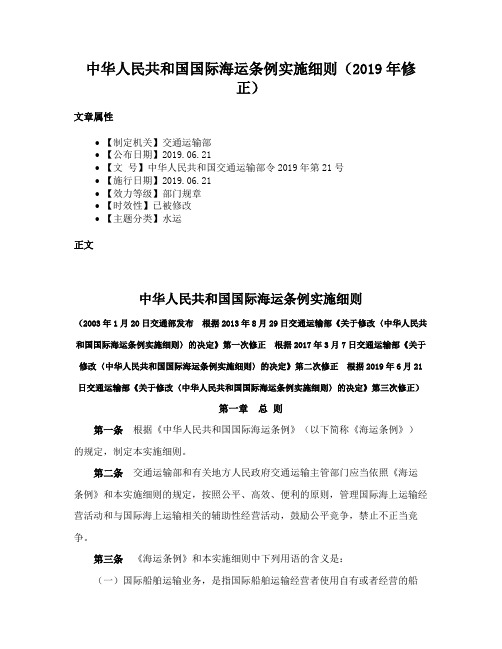
中华人民共和国国际海运条例实施细则(2019年修正)文章属性•【制定机关】交通运输部•【公布日期】2019.06.21•【文号】中华人民共和国交通运输部令2019年第21号•【施行日期】2019.06.21•【效力等级】部门规章•【时效性】已被修改•【主题分类】水运正文中华人民共和国国际海运条例实施细则(2003年1月20日交通部发布根据2013年8月29日交通运输部《关于修改〈中华人民共和国国际海运条例实施细则〉的决定》第一次修正根据2017年3月7日交通运输部《关于修改〈中华人民共和国国际海运条例实施细则〉的决定》第二次修正根据2019年6月21日交通运输部《关于修改〈中华人民共和国国际海运条例实施细则〉的决定》第三次修正)第一章总则第一条根据《中华人民共和国国际海运条例》(以下简称《海运条例》)的规定,制定本实施细则。
第二条交通运输部和有关地方人民政府交通运输主管部门应当依照《海运条例》和本实施细则的规定,按照公平、高效、便利的原则,管理国际海上运输经营活动和与国际海上运输相关的辅助性经营活动,鼓励公平竞争,禁止不正当竞争。
第三条《海运条例》和本实施细则中下列用语的含义是:(一)国际船舶运输业务,是指国际船舶运输经营者使用自有或者经营的船舶、舱位,提供国际海上货物运输和旅客运输服务以及为完成这些服务而围绕其船舶、所载旅客或者货物开展的相关活动,包括签订有关协议、接受订舱、商定和收取客票票款和运费、签发客票和提单及其他相关运输单证、安排旅客上下船舶、安排货物装卸、安排保管、进行货物交接、安排中转运输和船舶进出港等活动。
(二)国际船舶运输经营者,包括中国国际船舶运输经营者和外国国际船舶运输经营者。
其中,中国国际船舶运输经营者是指依据《海运条例》和本实施细则规定取得《国际船舶运输经营许可证》经营国际船舶运输业务的中国企业法人;外国国际船舶运输经营者是指依据外国法律设立经营进出中国港口国际船舶运输业务的外国企业。
- 1、下载文档前请自行甄别文档内容的完整性,平台不提供额外的编辑、内容补充、找答案等附加服务。
- 2、"仅部分预览"的文档,不可在线预览部分如存在完整性等问题,可反馈申请退款(可完整预览的文档不适用该条件!)。
- 3、如文档侵犯您的权益,请联系客服反馈,我们会尽快为您处理(人工客服工作时间:9:00-18:30)。
国际船舶运输经营者依法取得经营进出中国港口国际班轮运输业务资格后,交通部在其政府网站公布国际班轮运输经营者名称及其提单格式样本。
(一)申请书;
(二)可行性分析报告;
(三)母公司的商业登记文件;
(四)母公司的《国际船舶运输经营许可证》副本;
(五)母公司对该分支机构经营范围的确认文件;
(六)符合交通部要求的高级业务管理人员的从业资格证明。
中国国际船舶运输经营者的分支机构可为其母公司所有或者经营的船舶提供办理船舶进出港口手续、安排港口作业、接受订舱、签发提单、收取运费等服务。
(十六)运价协议,是指两个或者两个以上国际班轮运输经营者之间订立的关于收费项目及其费率、运价或者附加费等内容的协议,包括具有上述内容的会议纪要。
(十七)公布运价,是指国际班轮运输经营者和无船承运业务经营者运价本上载明的运价。运价本由运价、运价规则、承运人和托运人应当遵守的规定等内容组成。
(十八)协议运价,指国际班轮运输经营者与货主、无船承运业务经营者约定的运价,包括运价及其相关要素。协议运价以合同或者协议形式书面订立。
(十九)从业资历证明文件,是指被证明人具有3年以上从事国际海上运输或者国际海上运输辅助性经营活动经历的个人履历表。个人履历表须经公证机关公证。
第二章国际海上运输及其辅助性业务的经营者
第四条 在中国境内设立企业经营国际船舶运输业务,或者中国企业法人申请经营国际船舶运输业务,应当符合《海运条例》第五条规定的条件,考虑交通部公布的国际海运市场竞争状况和国家关于国际海上运输业发展的政策。
(九)国际海运集装箱站与堆场业务经营者,是指依照中国法律设立,提供海运货物集装箱的堆存、保管、清洗、修理以及集装箱货物的存储、集拼、分拨等服务的中国企业法人。
(十)外商投资企业,是指依照中国法律投资设立的中外合资经营企业、中外合作经营企业和外商独资企业。
(十一)外商常驻代表机构,是指外国企业或者其他经济组织在中国境内依法设立的,为其派出机构开展宣传、推介、咨询和联络活动的非营业性机构。
(一)申请书;
(二)可行性分析报告、投资协议;
(三)申请人的企业商业登记文件(拟设立企业的,主要投资人的商业登记文件或者身份证明);
(四)船舶所有权证书、国籍证书和法定检验证书的副本或者复印件;
(五)提单、客票或者多式联运单证样本;
(六)符合交通部规定的高级业务管理人员的从业资格证明。
有关省、自治区、直辖市人民政府交通主管部门自收到上述抄报材料后,应当就有关材料进行审核,提出意见,并应当自收到有关材料之日起10个工作日内将有关意见报送交通部。
交通部收到申请人的申请材料后,应当在申请材料完整齐备之日起30个工作日内按照《海运条例》第五条和第六条的规定进行审核,作出许可或者不许可的决定。决定许可的,向申请人颁发 《国际船舶运输经营许可证》;决定不许可的,应当书面通知申请人并告知理由。
第六条中国国际船舶运输经营者在中国境内设立分支机构的,适用本实施细则第五条规定的程序。申请材料应当包括:
第十一条申请办理无船承运业务经营者提单登记的,应当向交通部提出提单登记申请,报送相关材料,并应当同时将申请材料抄报企业所在地或者外国无船承运业务经营者指定的联络机构所在地的省、自治区、直辖市人民政府交通主管部门。申请材料应当包括:
(一)申请书;
(二)可行性分析报告;
(三)企业商业登记文件;
(四)提单格式样本;
(四)无船承运业务,是指《海运条例》第七条第二款规定的业务,包括为完成该项业务围绕其所承运的货物开展的下列活动:
(1)以承运人身份与托运人订立国际货物运输合同;
(2)以承运人身份接收货物、交付货物;
(3)签发提单或者其他运输单证;
(4)收取运费及其他服务报酬;
(5)向国际船舶运输经营者或者其他运输方式经营者为所承运的货物订舱和办理托运;
(四)固定营业场所的证明文件;
(五)《海运条例》第九条第(一)项规定的高级业务管理人员的从业资历证明文件;
(六)关于同港口和海关等口岸部门进行电子数据交换的协议。不具备电子数据交换条件的,应当提供有关港口或者海关的相应证明文件。
有关省、自治区、直辖市人民政府交通主管部门收到上述抄报材料后,应当就有关材料进行审核,提出意见,并应当自收到有关材料之日起7个工作日内将有关意见报送交通部。
第八条中国企业法人申请经营国际船舶管理业务或者在中国境内设立企业经营国际船舶管理业务,应当向拟经营业务所在地的省、自治区、直辖市人民政府交通主管部门提出申请,申请材料应当包括:
(一)申请书;
(二)可行性分析报告、投资协议;
(三)申请人的商业登记文件(拟设立企业的,主要投资人的商业登记文件或者身份证明);
(四)固定营业场所的证明文件;
(五)《海运条例》第十一条第(一)项规定的高级业务管理人员的从业资历证明文件;
(六)《海运条例》第十一条第(二)项规定的人员的船长、轮机长适任证书复印件;
有关省、自治区、直辖市人民政府交通主管部门收到申请人的申请材料后,应当在申请材料完整齐备之日起15个工作日内进行审核。材料真实且符合《海运条例》第十一条规定条件的,予以资格登记,并颁发《国际海运辅助业经营资格登记证》;材料不真实或者不符合《海运条例》第十一条规定条件的,不予登记,书面通知申请人并告知理由。申请人持《国际海运辅助业经营资格登记证》向企业登记机关办理企业登记,向税务部门和外汇管理部门指定的银行办理相关手续。
(五)母公司确定该分支机构经营范围确认文件;
(六)营业场所的证明文件;
(七)《海运条例》第九条、第十一条规定的人员的从业资历或者资格的证明文件;
(八)国际船舶代理经营者设立分支机构的,有关该分支机构同港口和海关等口岸部门进行电子数据交换的协议。不具备电子数据交换条件的,应当提供有关港口或者海关的相应证明文件。
(五)保证金已交存的银行凭证复印件。
申请人为外国无船承运业务经营者的,还应当提交本实施细则第二十五条规定的其指定的联络机构的有关材料。
有关省、自治区、直辖市人民政府交通主管部门自收到上述抄报材料后,应当就有关材料进行审核,提出意见,并应当自收到抄报的申请材料之日起7个工作日内将有关意见报送交通部。
交通部收到申请人的材料后,应当在申请材料完整齐备之日起15个工作日内按照《海运条例》第七条和第八条的规定进行审核。审核合格的,予以提单登记,并颁发《无船承运业务经营资格登记证》;不合格的,应当书面通知当事人并告知理由。
(二)国际船舶运输经营者,包括中国国际船舶运输经营者和外国国际船舶运输经营者。其中,中国国际船舶运输经营者是指依据《海运条例》和本实施细则规定取得《国际船舶运输经营许可证》经营国际船舶运输业务的中国企业法人;外国国际船舶运输经营者是指依据外国法律设立经营进出中国港口国际船舶运输业务的外国企业。
(三)国际班轮运输业务,是指以自有或者经营的船舶,或者以《海运条例》第十六条第三款规定的方式,在固定的港口之间提供的定期国际海上货物或旅客运输。
中国的申请人取得《无船承运业务经营资格登记证》,并向原企业登记机关办理企业相应登记手续后,方可从事无船承运业务经营活动。
第十二条外国无船承运业务经营者按照外国法律已取得经营资格且有合法财务责任保证的,在按照《海运条例》和本实施细则申请从事进出中国港口无船承运业务时,可以不向中国境内的银行交存保证金。但为了保证外国无船承运业务经营者清偿因其不履行承运人义务或者履行义务不当所产生的债务以及支付罚款,满足《海运条例》第八条第三款的规定,该外国无船承运业务经营者的政府主管部门与中国政府交通主管部门应就财务责任保证实现方式签订协议。
(十四)班轮公会协议,是指符合联合国《1974年班轮公会行动守则公约》定义的,由班轮公会成员之间以及班轮公会之间订立的各类协议。
(十五)运营协议,是指两个或者两个以上国际班轮运输经营者为稳定或者控制运价订立的关于在一条或者数条航线上增加或者减少船舶运力协议,以及其他协调国际班轮运输经营者共同行动的协议,包括具有上述性质内容的会议纪要;两个或者两个以上国际班轮运输经营者为提高运营效率订立的关于共同使用船舶、共同使用港口设施及其他合作经营协议和各类联盟协议、联营体协议。
交通部应当在其政府网站和其他适当媒体上及时公布国际海运市场竞争状况和国家关于国际海上运输业发展的政策。上述状况和政策未经公布,不得作为拒绝申请的理由。
第五条在中国境内设立企业经营国际船舶运输业务,或者中国企业法人申请经营国际船舶运输业务,申请人应当向交通部提出申请,报送相关材料,并应同时将申请材料抄报企业所在地的省、自治区、直辖市人民政府交通主管部门。申请材料应当包括:
(六)国际船舶代理经营者,是指依照中国法律设立从事《海运条例》第二十九条规定业务的中国企业法人。
(七)国际船例》第三十条规定业务的中国企业法人。
(八)国际海运货物仓储业务经营者,是指依照中国法律设立,提供海运货物仓库保管、存货管理以及货物整理、分装、包装、分拨等服务的中国企业法人。
第三条 《海运条例》和本实施细则中下列用语的含义是:
(一)国际船舶运输业务,是指国际船舶运输经营者使用自有或者经营的船舶、舱位,提供国际海上货物运输和旅客运输服务以及为完成这些服务而围绕其船舶、所载旅客或者货物开展的相关活动,包括签订有关协议、接受定舱、商定和收取运费、签发提单及其他相关运输单证、安排货物装卸、安排保管、进行货物交接、安排中转运输和船舶进出港等活动。
第七条在中国境内设立企业法人经营国际船舶代理业务或者中国企业申请经营国际船舶代理业务,应当向交通部提出申请,报送相关材料,并应当同时将申请材料抄报企业所在地的省、自治区、直辖市人民政府交通主管部门。申请材料应当包括:
